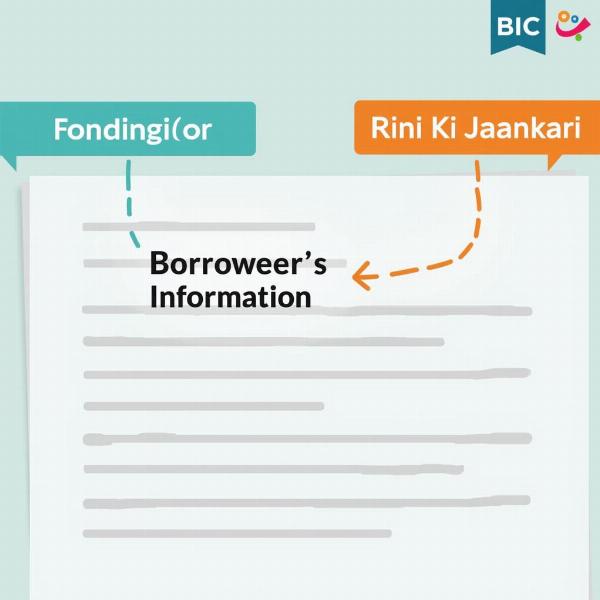Understanding the Hindi meaning of “borrower” is crucial for anyone navigating financial transactions or legal documents in India. Whether you’re dealing with loans, mortgages, or simply lending a helping hand, knowing the appropriate Hindi terminology is essential for clear communication and avoiding misunderstandings. This article delves into the various Hindi translations of “borrower,” exploring their nuances and providing context for their usage.
Who is a Borrower in Hindi?
The most common Hindi word for “borrower” is ऋणी (Rini). This term is widely understood and accepted across India. It’s derived from the Sanskrit word “ऋण (Rin),” meaning debt or loan. Therefore, ऋणी (Rini) literally translates to “one who has debt” or “one who is indebted.” It accurately captures the essence of a borrower as someone who has received something, usually money, with the obligation to repay it.
Other terms that can be used to describe a borrower in Hindi include लेने वाला (Lene Wala) which translates to “the one who takes,” and उधार लेने वाला (Udhar Lene Wala) meaning “the one who takes on loan/credit.” While these terms are less formal than ऋणी (Rini), they are often used in casual conversations. They effectively convey the act of borrowing, particularly in informal settings.
Understanding the Context: Using the Right Term
Choosing the appropriate Hindi word for “borrower” depends heavily on the context. In formal settings, such as legal documents or financial agreements, ऋणी (Rini) is the preferred term due to its precise meaning and legal connotations. Using लेने वाला (Lene Wala) or उधार लेने वाला (Udhar Lene Wala) in such situations might be perceived as unprofessional or imprecise.
However, in everyday conversations, these less formal terms are perfectly acceptable. For instance, when talking about borrowing a book from a friend, you might say “किताब लेने वाला कौन है? (Kitaab Lene Wala Kaun Hai?)” – “Who is the one who borrowed the book?” In this context, using ऋणी (Rini) would sound overly formal and unnatural.
Hindi Meaning of Borrower in Different Scenarios
What is the Hindi meaning of Borrower in a Loan Agreement?
In a loan agreement, “borrower” is invariably translated as ऋणी (Rini). This term is legally recognized and establishes the individual’s responsibility to repay the loan according to the agreed-upon terms. Using a less formal term could lead to ambiguity and potential legal complications.
How do you say “Borrower’s Information” in Hindi?
“Borrower’s information” can be translated as ऋणी की जानकारी (Rini Ki Jaankari). This phrase is commonly used in loan applications and other financial forms. It signifies the details required from the borrower, such as their name, address, and financial history.
 Borrower's Information in Hindi: Rini ki Jaankari
Borrower's Information in Hindi: Rini ki Jaankari
What are some other related terms?
Other related terms that might be useful include “loan” (ऋण – Rin), “lender” (ऋणदाता – Rindata), “interest” (ब्याज – Byaj), and “repayment” (चुकाना – Chukana). Understanding these terms will further enhance your ability to discuss borrowing and lending in Hindi. sanctioned in hindi meaning is also a useful term in the financial context.
Conclusion
Understanding the Hindi meaning of “borrower” goes beyond simple translation. It requires grasping the nuances of the language and choosing the appropriate term based on the context. While ऋणी (Rini) serves as the formal and legally recognized term, less formal options like लेने वाला (Lene Wala) and उधार लेने वाला (Udhar Lene Wala) are suitable for casual conversations. Using the correct terminology ensures clear communication and demonstrates respect for the Hindi language. You might also want to check out hindi meaning of borrowers, equitable mortgage meaning in hindi, and money lent meaning in hindi for more related information.
FAQ
-
What is the most formal Hindi word for “borrower”? ऋणी (Rini) is the most formal and legally accepted term.
-
Can I use “लेने वाला (Lene Wala)” in a loan agreement? While understandable, using “लेने वाला (Lene Wala)” in a formal document is not recommended. Stick to “ऋणी (Rini)”.
-
How do I ask “Who is the borrower?” in Hindi? You can ask “ऋणी कौन है? (Rini Kaun Hai?)” or, informally, “किसे उधार लिया है? (Kise Udhar Liya Hai?)” – “Who has taken the loan?”.
-
What is the Hindi word for “loan”? The Hindi word for “loan” is ऋण (Rin).
-
What is the opposite of “borrower” in Hindi? The opposite of “borrower” (ऋणी – Rini) is “lender” (ऋणदाता – Rindata).
Meaning-Hindi.in is your one-stop solution for all your Hindi translation needs. We offer a wide range of professional translation services, from business and legal documents to technical manuals and website localization. Our team of expert Hindi linguists ensures accurate and culturally sensitive translations, helping you bridge the language gap effectively. fitch meaning in hindi is another specialized term we can help you with. Contact us today at [email protected] or call us at +91 11-4502-7584 to discuss your translation requirements. Meaning-Hindi.in is here to make communication seamless.